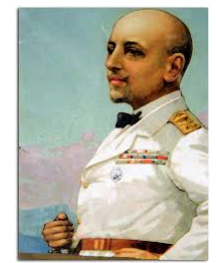JANUARY 26, 2014 GENERAL SOCIETY MEETING: D’ANNUNZIO PRESENTATION DRAWS BIG CROWD
The year got off to a great start as the first program of 2014 drew a sizeable crowd to Casa Italiana on Sunday, January 26. The idea of the program came about after Maria D’Andrea saw a book review on an awardwinning book entitled “Gabriele D’Annunzio: Poet, Seducer and Preacher of War” by Lucy Hughes-Hallett. This most famous writer from Abruzzo, who was also a controversial historical figure with a decidedly dark side, seemed like a topic our members would enjoy knowing more about.
Over a game of cards, AMHS members Romeo Sabatini and Ennio DiTullio invited Professor Roberto Severino to be our speaker and he graciously accepted. Professor Severino, who was born in Catania, Sicily, is well known to many of our members as Professor Emeritus at Georgetown University’s Italian Studies Department and as President Emeritus of the American University of Rome. He is also a poet, a collector of rare books of Italy, a jokester who tells very funny jokes, and a champion card player (He has 6 briscola trophies to prove it!). One of his card-playing buddies, Omero Sabatini, uses the words “fuori serie” to describe Professor Severino, meaning he is “in a class by himself.
” So expectations were high for Professor Severino’s talk and he did not disappoint. Aided by Romeo Sabatini’s slides, Professor Severino described how the young Gabriele D’Annunzio’s early life had a bearing on his later years. He was born in Pescara in 1863 into a rather dysfunctional family but his precocious talent was recognized early on and he was sent to school in Prato and later studied at the Rome University La Sapienza where he became a member of various literary groups and wrote articles and critiques for local newspapers. But the style and content of his writings began to alarm critics who called him a perverter of public morals, although others called him a breath of fresh air. D’Annunzio published his first novel (Il Piacere) in 1889. His first poetry was also written around this time.
As D’Annunzio was gaining notoriety for his work, his personal life was a mess. Although he was not considered at all handsome by the standards of the day, he had no problem attracting women - lots of them!! He married Maria Hardovin di Gallese, then after ending the marriage, he began an affair with the famous actress Eleanora Duse. D’Annunzio provided roles for her in some of his plays before the stormy relationship finally ended in 1920.
All the while, his extravagant daredevil lifestyle forced him into debt, so he fled to France to escape his creditors. Eventually returning to Italy as World War I was about to begin, he volunteered and achieved further celebrity. The war strengthened D’Annunzio’s ultra-nationalist views which have been called by some the precursor to fascism.
Angered by the proposed handing over of the city of Fiume (now in Croatia) which had a majority Italian population, D’Annunzio led the seizure of Fiume and declared Fiume an independent state. Needless to say, this did not go well for him, and he ended up finally surrendering after a bombardment by the Italian navy.
After the Fiume debacle, D’Annunzio retreated to his home in Gardone Riviera on Lake Garda where he established the Vittoriale degli Italiani, an impressive museum and literary and historical archive which also holds his torpedo boat and a plane. The crafty D’Annunzio bequeathed the Vittoriale degli Italiani to the Italian government which then became responsible for paying for the upkeep.
Professor Severino also delved into the complex rivalry between D’Annunzio and Benito Mussolini. D’Annunzio is often seen as the precursor of the ideals and techniques of Italian fascism after his political ideas took shape in Fiume with the help of Alceste de Ambris. Mussolini imitated the culture of dictatorship that he learned from D’Annunzio, but the two men were wary of each other. In 1922, D’Annunzio was seriously injured when he was pushed out of a window by an unknown assailant. He survived but was badly injured. D’Annunzio retreated from public life after this incident, yet Mussolini doled out funds to D’Annunzio as a bribe for not entering the political arena. Professor Severino noted that Mussolini reportedly said that “when you have a rotten tooth, you have two possibilities open to you - either you pull out the tooth or you fill it with gold.
” Nevertheless, D’Annunzio kept trying to intervene in politics, such as trying to convince Mussolini not to enter into an alliance with Adolph Hitler. In 1924, King Victor Emmanuel III gave D’Annunzio the title of Principe di Montenevoso.
At the height of his success, he was known for the originality, power and decadence of his writing, which had a big impact throughout Europe and influenced generations of Italian writers.
At the end of the presentation, we saw a video narration of D’Annunzio’s famous poem “La Pioggia nel Pineto” (“The Rain in the Pinewood”) with background music by Chopin. Some in the audience remember having to memorize it as school children. It was indeed beautiful!!
A delicious lunch was provided by Pasta Plus. (AMHS members will recall that the owners, Massimo and Sabatino Mazziotti, raised $17,000 in one night in a fundraiser for the victims of the April 2009 earthquake in Abruzzo).


